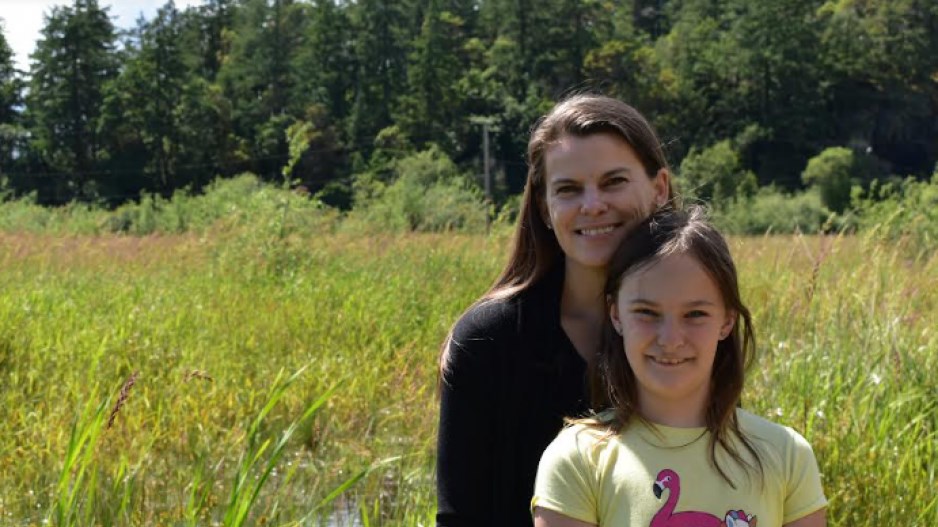Severe drought. We are increasingly familiar with what this means in British Columbia. Sechelt’s primary water source has completely dried up. Tens of thousands of salmon died in Heiltsuk Territory when Neekas Creek dried up. Concern and grief are mounting.
And now we wait, with countless others, for the rains to come. The question is, what can we do while we are waiting?
We can heal our relationship with water.
I am an Indigenous woman working as a medical health officer in the Cowichan Valley Region – my home territory on Vancouver Island. Climate change affects all areas of my work. These increasingly frequent droughts remind me that water is our relative. We take care of our watersheds, and they take care of us.
In my role for Island Health, each drought over the last five years has offered different lessons.
During the extreme drought of 2015, Drinking Water Systems Operators were asked how prepared they were for the dry conditions. Unsurprisingly, there were very few plans in existence for responding to drought. Droughts occurred from 2016 to 2020, but they were less extreme in intensity and duration, which allowed some to think we do not have a problem. The heat dome of 2021 escalated a drought so severe that, for the first time, parts of B.C. reached the highest level (level 5) on the provincial drought scale. Domestic wells ran dry, farmers had to reduce irrigation, and pumps were installed at Cowichan Lake to keep the Cowichan River flowing if needed. This is particularly sobering for a region that is often affiliated with wet walks in water-loving forests.
Once again, regions of Island Health are experiencing level 5 drought. While groundwater levels are stable in most of our aquifer systems, we haven’t seen any significant precipitation. This could start impacting many drinking water systems very soon. In the meantime, drought is impacting the livelihoods of those whose jobs are connected to rivers and lakes. Food security is affected by lack of irrigation or lack of water for salmon swimming home. Mental, emotional, physical and spiritual health is affected as the places we go for recreation/solace/cultural practices are significantly changed. Drought is also severely impacting our plant and animal relatives.
As a Hul’qumi’num woman, I turn to the wisdom of building and maintaining relationships that have nourished our being for generations upon generations.
As a medical health officer, I recognize the need to align our provincial water laws with the Declaration on the Rights of Indigenous Peoples Act so that our sovereign, inherent and treaty rights are protected, including our “right to maintain and strengthen” “distinctive spiritual relationships” with our territories and waters. When water is regarded as a relative – as a spiritual, living being, rather than a commodity that can be claimed, controlled and colonized, decisions are approached with the goal of preserving an enduring relationship. This has transformative potential, particularly in the area of protecting the sources of drinking water – the rivers, lakes and aquifers – where western legislation has failed.
We need to centre our relationship with water in all of our decision-making. Governance by, or co-governance with, Indigenous peoples is key to ensuring this is happening. A recent United Nations report states that “nature is declining less rapidly in Indigenous peoples’ lands than in other lands” and that “governance […] involving Indigenous peoples […] can be an effective way to safeguard nature”. The Cowichan Watershed Board is a unique collaborative body co-chaired by Cowichan Tribes and Cowichan Valley Regional District and is one of several examples within the province of how this can be done.
We must put our energy, our labour, time and money into holding up and protecting our watersheds. Targets and accountability must be defined.
Aligning laws, enacting co-governance and allotting resources are crucial steps to healing our relationship with water.
The provincial government has committed to creating a new long-term Watershed Security Fund, which is now urgently needed to support Indigenous Nations, local governments, and communities in working together to take the actions required to safeguard our water sources.
I am grateful for those who walk the path – to chiefs, youth, health workers, salmon, and rivers - for committing to this important work. We need to draw on everyone’s gifts – including yours - to get through the seasons that lie ahead.
Dr. Shannon Waters is a medical health officer in the Cowichan area.




